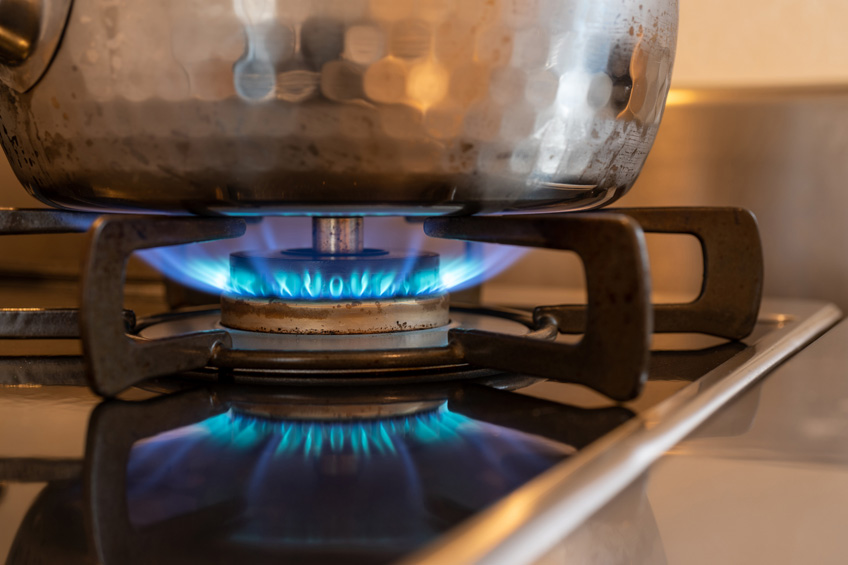Electrification is a hot topic this year, and not just for heating. We’ve seen the rise of rooftop solar, electric vehicles, and heat pumps, and now, in a throwback to the 1950s, the all-electric home is getting tons of publicity. And that’s making lots of home chefs who claim gas is the only way to cook very nervous.
Is the Gas Stove on the Way Out?
Maybe, maybe not. To a large extent it depends on where you live.
Despite some shaky science regarding the health hazards of using gas appliances, many Colorado cities and towns—Denver included—are looking at banning gas appliances. They’re even considering changing building codes to prohibit running natural gas lines to most new developments. Crested Butte has already done it and Louisville isn’t far behind.
While it’s unlikely they’ll cut off your gas service and confiscate your stove and other gas appliances, it could get harder to “cook with gas” in the future.
So what’s a gas fan to do?
Gas vs. Electric Cooking
Advocates of gas cooking point out that gas stoves turn up, down, and off immediately and can be regulated precisely by simply looking at the burner flame. And while that’s true in comparison to traditional electric cooktops, there’s a new kid on the block—induction cooking.
Electric coils, either open coils or glass top types, have to warm up and take longer to change temperatures; induction stoves use a magnetic field to generate heat rather than heating coils. Because of this, they respond instantly to changes, and they do it without wasting energy in the process.
Gas burners and open electric coils waste a lot of heat by warming the air around them and they stay hot long after they’re turned off. Induction burners, on the other hand, only use energy when a pot or pan is on them. No contact, no heat or energy use or waste. In fact, studies have shown that induction burners are 90% efficient compared to a mere 30% for gas burners. And they boil water twice as fast.
For a quick look at how induction cooking works, check out this YouTube video from This Old House.
Can I Use My Existing Cookware with Induction?
Since induction heating uses magnetic fields to generate heat, your cookware needs to have iron in it. Cast iron works beautifully, including enameled cast iron, as does most carbon and stainless steel.
Aluminum isn’t magnetic, so it won’t work, nor will glass. Copper cookware can be used if it’s clad with stainless steel, as may some aluminum pots and pans. And if all else fails, a disk of ferrous (iron-containing) metal can be put between the burner and the pan to transfer the heat. Just be careful because the disk will be as hot as the pan.
Most induction-friendly cookware sold today has a coil symbol on its base. And you can use a magnet to check, too. If it’s strongly attracted to the cookware, it’ll probably be fine.
You may also need an analog thermometer. The magnetic field of an induction cooktop can interfere with a digital meat thermometer.
What Does It Cost to Go Electric?
That depends. If you’re swapping one electric stove with another—coil or induction—and the power needs are compatible, it’s simply a matter of trading one for the other. Converting from gas can be more complicated—and expensive.
Most electric coil stoves and cook tops are priced similarly to gas units with the same features. Induction models range from around $1,000 for a few basic models to several thousand, depending on features. But converting from gas to electric (any type) comes with incentives, some as high as $800 or more. Check your government and utility websites for details.
If you’re going from gas to electric, you’ll need to change your power source. Your gas line will need to be capped or removed and a new 240-volt dedicated outlet will be required. This work should only be done by a licensed electrical contractor and may require a permit, depending on where you’re located. You can learn more about making electrical conversions in this article on the Allstar Electrical Services website.
When It’s Time to Change, It’s Time to Call a Pro
“Going electric” can be complicated and expensive. If not done carefully, it can cost more than money—it can pose serious risks to both your property and the precious things it houses.
Let Allstar Electrical Services help you assess the costs and benefits of such a move. Give us a call at 303.399.7420 or visit our website. We’re top-rated by the Better Business Bureau and a preferred contractor by Angi’s Home Advisor. We’re ready to work with you to get the results you expect and deserve.


